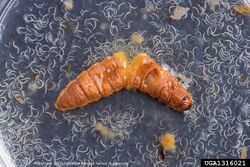Biology:Heterorhabditis bacteriophora
| Heterorhabditis bacteriophora | |
|---|---|

| |
| Heterorhabditis bacteriophora nematodes emerging from a greater wax moth. | |
| Scientific classification Error creating thumbnail: Unable to save thumbnail to destination
| |
| Domain: | Eukaryota |
| Kingdom: | Animalia |
| Phylum: | Nematoda |
| Class: | Chromadorea |
| Order: | Rhabditida |
| Family: | Heterorhabditidae |
| Genus: | Heterorhabditis |
| Species: | H. bacteriophora
|
| Binomial name | |
| Heterorhabditis bacteriophora Poinar, 1976
| |
Heterorhabditis bacteriophora is a species of entomopathogenic nematode known commonly as beneficial nematodes. They are microscopic and are used in gardening as a form of biological pest control. They are used to control ants, fleas, moths, beetles, flies, weevils, and other pests.
These beneficial nematodes enter target insect larva via mouth, anus or respiratory openings and starts to feed. To reproduce the nematodes release Photorhabdus bacteria from their digestive tract. The bacteria rapidly multiply in the target insect larva and kills it. The nematodes then use the larva cadaver to grow and reproduce.[1]
Biological Systems Research
These nematodes are amenable to in vitro culture, making them of interest to evolutionary and molecular biologists who investigate parasitic and symbiotic systems.[2] Heterorhabditis bacteriophora was selected by the National Human Genome Research Institute as a sequencing target. The inbred strain H. bacteriophora TTO1 was sequenced using Roche 454 technology, and a high-quality 77 Mb draft genome assembly was produced in 2013.[3]
References
- ↑ "Natural pest control with beneficial nematodes". Gardeninsects.com. http://www.gardeninsects.com/beneficialNematodes.asp.
- ↑ "Enhancement of entomopathogenic nematode production in in-vitro liquid culture of Heterorhabditis bacteriophoraby fed-batch culture with glucose supplementation". Applied Microbiology and Biotechnology 58 (6): 751–5. May 2002. doi:10.1007/s00253-002-0956-1. PMID 12021794.
- ↑ "A lover and a fighter: the genome sequence of an entomopathogenic nematode Heterorhabditis bacteriophora". PLOS ONE 8 (7): e69618. 2013-07-18. doi:10.1371/journal.pone.0069618. PMID 23874975. Bibcode: 2013PLoSO...869618B.
External links
- Leung, Tommy (2017-01-11). "Parasite of the Day: Heterorhabditis bacteriophora". http://dailyparasite.blogspot.com/2017/01/heterorhabditis-bacteriophora.html.
Wikidata ☰ Q3134908 entry
 |

